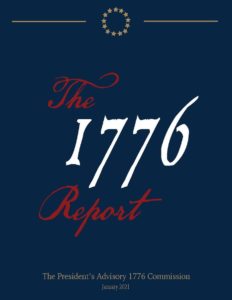
The debate about American history is over. The scholars can put down their pens; the archivists can start locking up. In a parting gift to a grateful nation, Donald Trump’s 1776 Commission has spoken. For generations to come their report on the ‘history and principles of the founding of the United States’ will stand at the centre of American historiography.
I’m joking, of course. The report is terrible. But first, a bit of background.
Mr Trump set up the 1776 Commission last autumn, during his doomed re-election campaign. It was an obvious riposte to the New York Times’s much-criticised 1619 Project, which argued that the true date of the nation’s founding was actually 1619, when the first African slaves were brought to Virginia. Even the American Revolution, it claimed, was driven by a desire to protect slavery. There was no escaping this original sin.
Many historians denounced all this as balderdash. But the NYT doubled down, printing hundreds of thousands of copies to send to schools across America. Then came the murder of George Floyd, sending the entire debate into overdrive. And then, with his unique gift for destruction, Mr Trump lobbed his own grenade into the chaos.
I have very little time for the 1619 Project. Its inaccuracies have been well chronicled, but the real problem, it seems to me, is its tone: strident, self-satisfied, suffused with moral certainty. Alas, Mr Trump’s 1776 Report makes it look like The Decline and Fall of the Roman Empire. It pains me to say that. But it’s true.
For there’s no getting away from it — the 1776 Report is abysmal. I’ve read Ladybird books with more complexity. In fact, that’s not a mad comparison, since it’s only 20 pages long (with pictures). Never is there a hint of doubt, a trace of self-criticism, even a fleeting nod to the principle of debate.
The most obvious example is slavery. Madly, the report tries to reinvent America as the world leader in opposition to slavery, as if the slave-holding Southern states never existed. In one especially bizarre section, it claims that the international anti-slavery movement began with the Declaration of Independence, ‘a dramatic sea change in moral sensibilities’.
But that’s not even the worst thing in the report. That’s the section on ‘Challenges to American Principles’, which names Communism, racism, fascism and … progressivism. Not progressivism as shorthand for Trotskyism: but the progressivism of Theodore Roosevelt, Woodrow Wilson and Franklin Roosevelt, three of the most consequential presidents in American history. There’s even a classroom exercise to hammer home the point. Students should read their speeches on ‘economic democracy’, the report says darkly, and then explain how they ‘differ from the principles and structure of the Constitution’.
Who wrote this rubbish? The report lists a handful of authors, but most have never written a history book in their lives. But perhaps it doesn’t matter. It’s impossible to imagine any sane teacher, no matter how desperate, taking this remotely seriously. And if it’s remembered at all, it will be only as a comical own goal.










Join the discussion
Join like minded readers that support our journalism by becoming a paid subscriber
To join the discussion in the comments, become a paid subscriber.
Join like minded readers that support our journalism, read unlimited articles and enjoy other subscriber-only benefits.
Subscribe